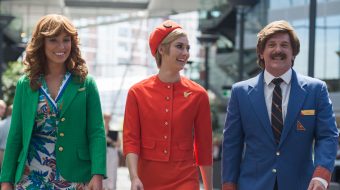Qantas has unveiled a new safety video featuring ‘80s mullets and ‘70s moustaches right through to 1940s flying boats and 1920s propeller aircraft to celebrate 100 years of the national carrier’s history.
The safety briefing is delivered by current Qantas crew in carefully recreated historical settings, including onboard aircraft and in airport terminals.
Qantas Group CEO Alan Joyce said safety videos are an important tool to communicate vital safety messages to the 55 million people who travel with Qantas every year – and that making it interesting helps keep their attention even after they’ve seen it multiple times.
“This safety video is a look back at the different styles of aircraft, service and uniforms that have been part of our long history. And it calls out the contribution Qantas and its people have made to aviation, like the invention of the slide raft, as well as the national carrier’s role in connecting Australia to the world,” said Mr Joyce.
“It’s really a tribute to a century of our people, the changing styles, and our innovation. The one thing that has never changed is our commitment to safety.”
The video features iconic aircraft, fashion and aviation milestones to create a 100-year time lapse from the 1920s to present day. Some of the scenes were recreated in real life, others such as the original Avro 504 and the 1930s De Havilland 86, were bought back to life using computer generated imagery.
The production team spent months researching information from the national archives, aviation museums. They also used photographs and artefacts from the extensive Qantas Heritage collection to perfect the details of each scene, from original life jackets to the wall panels from retired aircraft that were retrieved from the Mojave Desert.
With a soundtrack featuring Australian jazz legend James Morrison playing numerous brass instruments, the video is set to instrumental versions of the iconic Peter Allen anthem I Still Call Australia Home and tailored to the musical style of each era.
Current Qantas staff appear in historical versions of their present-day roles with Alastair Fysh, the grandson of Qantas co-founder Sir Hudson Fysh, also making a cameo appearance.
Various crew uniforms from throughout the decades were sourced from Qantas’s own collection and retired Qantas crew. The clothing for extras came from a combination of personal wardrobes and op shops in regional communities.
The new safety video will screen onboard all Qantas international and domestic flights from 1 March 2020.
BEHIND THE SCENES OF THE QANTAS CENTENARY SAFETY VIDEO
Twelve months in the making
The final product was the result of more than 12 months development and pre-production with the video being filmed over three weeks across seven destinations including Longreach, Rose Bay (Sydney), HARS Museum at Wollongong, Melbourne, Brisbane Airport and the pink lakes of Hutt Lagoon in Western Australia.
Picture perfect
Each aircraft cabin and scene are exact replicas of originals based on the photographs and details from the Qantas Heritage collection. Avgeeks and history buffs may notice:
- Wall panels in the 1970s upper deck taken from a retired 747-200 in the Mojave Desert, flown to Sydney and used to help recreate the Captain Cook lounge. Qantas then commissioned Instyle Interior Finishes to produce a bespoke replica of the vibrant colours and patterns of the 1970s 747 lounge furniture.
- The original Australian Wildflower pattern on the walls of the Boeing 707.
- An original tea set from the 1940s.
- An original life jacket in the Rose Bay 1930s scene, one of only two remaining from this era.
- Using original artwork and drawings from Indigenous design studio Balarinji, the 747 with the Wunala Dreaming livery was recreated using computer generated imagery technology.
Mullets, moustaches and miniskirts
Recreating a century of evolving fashion required creative problem solving.
- Small town op shops were a treasure trove for the carefully curated wardrobe of the extras in each scene with the Longreach St Vincent de Paul proving a goldmine for the 1980s era.
- While each of the original uniforms were authentic, some of the hair was not. Production crews used 50 wigs and 30 moustaches to capture the head-to-toe style of each era.
A custom-built slide
The Avro 504 in the opening scene belongs to the Qantas Founders Museum in Longreach who allowed the aircraft to be taken out of its exhibition to the tarmac. The Art Director worked with an engineer to design and build a custom slide raft that could be taken off its permanent plinth and moved to the tarmac without damage.
Music through the decades
The soundtrack was created by Bruce Heald from Noise International who arranged the music for the original Qantas I Still Call Australia Home campaigns. James Morrison played saxophone, all trumpets and all trombones.
Industry credits
| Agency: | Brand + Story |
| Production: | Positive Ape |
| Soundtrack: | Bruce Heald from Noise International featuring James Morrison |
| CGI: | White Chocolate, Sydney |
| Wardrobe: | Melissa Rutherford |

